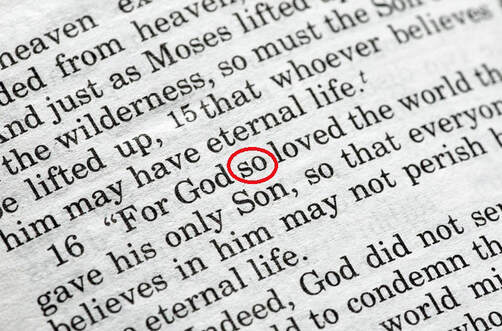Consider a simple but interesting example. In John 3:16 – the best-known verse in the New Testament and perhaps of the whole Bible – we read “God so loved the world, that he gave his only Son …” Most people presume this means that God loved the world “so much” that he gave his Son (in fact some versions, such as the Message Bible, actually mistranslate the verse that way). But houtos does not mean “so much.” It almost always means “in this way,” and what John 3:16 really tells us is the manner in which God loved the world – how, not how much. That is the clear meaning of the verse, and it is translated as such by modern Bible versions such as the Christian Standard Bible (“For God loved the world in this way …”) rather than using the ambiguous English word “so” which can mean “in this way,” but which is usually presumed to mean “so much”!
But this is not just an interesting minor detail of New Testament Greek. The meaning of houtos and the confusion that arises when it is translated “so” can sometimes affect matters of doctrine and Christian living. A good example is found in Paul’s words regarding the Lord’s Supper in 1 Corinthians. The King James Version translates a key part of Paul’s instruction: “But let a man examine himself, and so let him eat of that bread, and drink of that cup” (1 Corinthians 11:28 KJV, emphasis added here and below). Here we can see the ambiguous “so” which could easily be understood in this verse as meaning that we should examine ourselves (ahead of time) so that we are properly prepared to take the bread and wine. Many translations actually render the verse that way – along the lines of what is found in the New International Version: “Everyone ought to examine themselves before they eat of the bread and drink from the cup” (1 Corinthians 11:28 NIV), or the International Standard Version “A person must examine himself and then eat the bread and drink from the cup.”
Versions that follow this path leave the reader with the understanding that we must examine ourselves first, and then – as a consequence or a result of having done so – we should eat the bread and drink the wine. But as we saw above, the Greek word houtos which is translated ambiguously as “so” in the KJV rendering of this verse, and as “then,” “before,” or in some similar way in other translations, does not carry these meanings. When we translate the word houtos correctly as “in this manner,” we see that Paul’s meaning was that those who participate in the Lord’s Supper should do so in a self-examining manner as they participate, rather than before they do.
Several recent versions of the New Testament have been careful to follow the clear meaning of houtos and translate 1 Corinthians 11:28 as it should be understood. For example, “But let a man examine himself, and in this manner let him eat of the bread, and let him drink of the cup” (Berean Literal Bible) and “Let a person examine himself; in this way let him eat the bread and drink from the cup” (Christian Standard Bible). In these translations it is much easier to see that Paul’s instruction was not to examine ourselves before we take the bread and wine, but as we do so. Put another way, the self-examination Paul urges is not a completed action performed a number of hours or days before partaking of the bread and wine, but a present, continuous action during the Lord’s Supper.
This understanding of the verse helps us to better see Paul’s point regarding self-examination. It is certainly not intended to help us determine if we are somehow worthy to take the Lord’s Supper – we are all unworthy, and that is one of the reasons we take it – but to help us participate in the Supper in a spiritually conscious manner – to make sure that we are not guilty of the excesses and improper taking of the Supper in those ways Paul condemns in the immediate context of 1 Corinthians 11:28.
Fortunately, a number of newer Bible versions are starting to follow the clear meaning of houtos in whatever context it is found – and in doing so they remind us of just how careful we need to be in the translational use of that unassuming but highly ambiguous English word, “so.”

 RSS Feed
RSS Feed
